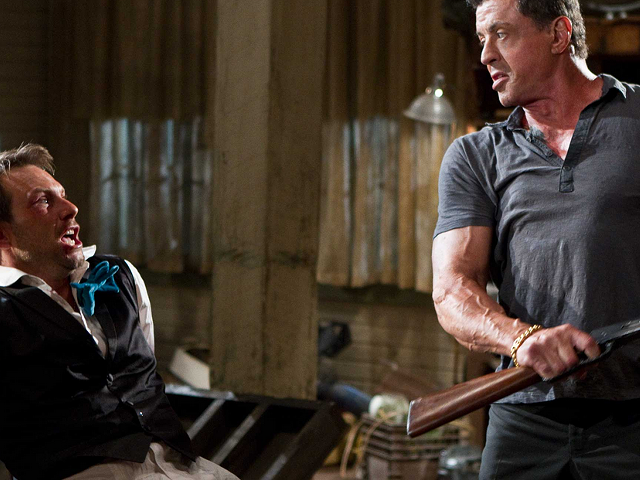To watch Melissa McCarthy as lovable chef Sookie St. James on seven seasons of the Gilmore Girls was to see an actress perfect the art of playing a sidekick. As best friend of the show's protagonist, Lorelai Gilmore (Lauren Graham), McCarthy dutifully provided comic relief and a shoulder on which to cry, while wrapping her tongue around show-creator Amy Sherman-Palladino's reference-packed, tommy gun–paced dialogue. McCarthy brought a pretty face, a sunny presence, and an ability to recede into the background. Gilmore Girls was never stingy about giving her subplots, but Sookie rarely overshadowed the story of Lorelai's on-again, off-again relationship with Luke (Scott Patterson) or Rory's (Alexis Bledel) travails, romantic and otherwise, first at high school and then in college. It wasn't that kind of part, and McCarthy fit into it, perfectly.
After Gilmore Girls, her future looked pretty clear: In the years ahead, we'd see McCarthy dispensing one-liners over cocktails to an unlucky-in-love protagonist played by Renée Zellweger. Or as a harried older sister tending to a brood of ill-behaved moppets in a scene or two as Kate Hudson figured out that her deep antipathy toward, oh, let's say, James Marsden, was actually a deep attraction destined to bring them for a climactic lip-clench at, oh, let's say Dodger Stadium.
Her first high-profile gig after Gilmore Girls was a slightly cracked variation on the best friend role on the under-watched Christina Applegate sitcom Samantha Who? Supporting parts in films like Life As We Know It seemed aligned with the obvious path, and even her starring role on the sitcom Mike & Molly, in which she plays one half of a Chicago couple whose relationship began at an Overeaters Anonymous gathering, feels like it could have been that career's natural point of termination, a safe place for an appealing star to ply her trade and wait for syndication money to start rolling in.
But then came Bridesmaids. The talk leading up to its release concerned whether it could prove to be a rare comedy hit of the non-rom com variety to star women. (It was, but that such a feat was still notable in 2011 said more about the sad, demo-first, marketing-driven state of the movie business than a sudden surge in funny women.) The talk coming out of Bridesmaids was focused one funny woman in particular: McCarthy, who stole her every scene as the butch but aggressively heterosexual member Megan. It's a broadly drawn character, and McCarthy plays the part even more broadly than it probably reads on the page, even as she shits in a sink or attempts to bully her way into the mile-high club by coming on to an exasperated air marshal (played by Ben Falcone, McCarthy's real-life husband). That she plays Megan as a character first and a punchline second, however, makes a tremendous difference.
Another performer might have been embarrassed by the material or made it embarrassing, winking to let the audience know that she was in on the joke—and that the nice lady from Gilmore Girls was still in there beneath that unflattering haircut and less-flattering wardrobe. Instead, McCarthy committed, making Megan brusque in her manner and blunt in her desires but also a creature of recognizable needs and vulnerabilities. She makes what could have been a cartoon into a human being. Late in the film, her no-nonsense counsel to Kristin Wiig feels like earned wisdom and not the sort of buffoon-to-sage turn seen so often in Tyler Perry films.
Bridesmaids left even those who'd watched Melissa McCarthy for years wondering where this Melissa McCarthy had been. Turns out she'd been hiding in plain sight. For evidence, look no further than The Nines, the mostly brilliant, little-seen 2007 directorial debut of screenwriter John August, best known for penning Go and a handful of Tim Burton scripts. A tale of converging realities told in three parts and starring Ryan Reynolds, Hope Davis, and McCarthy in each, its opening section casts McCarthy as a publicist whose beaming disposition hides a hard edge. In the final sequence she plays a character in the pilot episode of a supernatural TV series, a mother who comes to recognize that her life has taken a dark turn and her mute daughter (Elle Fanning) might be responsible for the shift.
But it's the middle installment that's most telling, the one where McCarthy plays herself. Or, rather, "herself," a version of McCarthy featured in a reality show about the making of the TV series seen in the film's final act, one she believes will at last move her from supporting player to star. Working for a show runner who's also a longtime friend (Reynolds), she's winning and funny as she talks about he lifelong obsession with nuns ("God's fag hags") then vicious when the deal falls apart and she's cast aside for a wispy actress who better fits the description of a network leading lady. "You can't control this one," she tells Ryan as the conversation becomes increasingly strained after he breaks the news. "Your little puppets are off their strings saying shit you didn't write."
The moment feels prescient now. McCarthy's brief, profane appearances in This Is 40 crack the movie open. With the new comedy Identity Thief, she gets a starring role. It might be great. It might be terrible. Either way, it's hers, and for now at least, she's a puppet off the strings, landing parts she wasn't supposed to get in big movies where no one expects her to fade into the background, playing characters who need best friends of their own.





